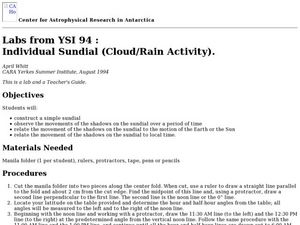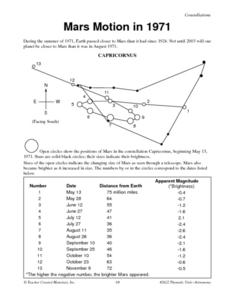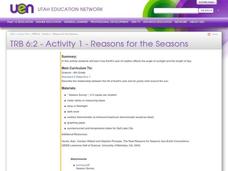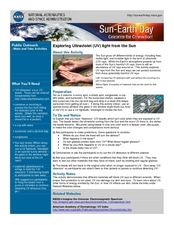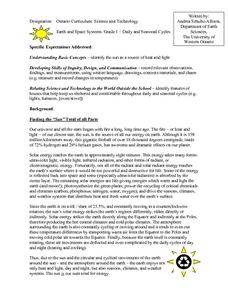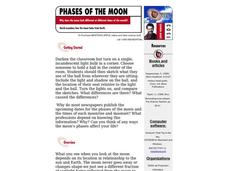Curated OER
Seasons and Shadows: Investigate How Shadows Shift Throughout the Year
Young scholars examine their shadows and why they are different in the summer and winter. In this seasons lesson plan students complete an activity to see how the earth's tilt on its axis changes the length of shadows.
Curated OER
Individual Sundial (Cloud/Rain Activity)
Pupils make a simple sundial to examine the changes in shadows over time. In this sundial and shadow lesson, students make a simple sundial out of a manila folder and pencil. They observe how shadows change over time, and relate it to...
Columbus City Schools
Moon Phase Mania
Now you see it, now you don't. Our moon seems to pull a disappearing act from time to time—but why? Take your seventh grade scientists above and beyond to discover the truth about the moon and the role it plays in Earth's little...
Purdue University
Global Design for the Seasons
People don't all get the same amount of sun at the same time of the year. Collaborative groups explore how the motion of Earth contributes to the idea in an inquiry-based STEM lesson. Learners first investigate how the rotation of Earth...
Curated OER
Incoming Solar Radiation
Demonstrate how the spherical shape of the Earth contributes to unequal heating of its surface and results in varying climates at different latitudes. This would be an illuminating addition to your meteorology lessons, especially when...
Curated OER
How Far Away is SOHO?
Students create a scale model of the Earth and the sun that demonstrates where the SOHO satellite is in relation to the Earth.
Curated OER
Mars Motion in 1971
In this science learning exercise, students read about the summer of 1971 when the Earth passed closer to Mars than it had since 1924. Students also learn about the retrograde motion of Mars as seen from Earth.
School Science
The Big Bang Time Machine
Scholars take off on an interactive spaceship to explore a historical timeline of the big bang theory. They learn about the evolution of mammals and humans, the formation of stars and planets, and the chemical composition of the early...
K20 LEARN
This Is How the World Ends: Coronal Mass Ejections/Space Storms
Is this the end of the world as we know it? Pupils prepare for a coronal mass ejection during a lesson from the K20 Center. The activity combines video and Internet research in a collaborative assignment that focuses on public safety...
California Academy of Science
Kinesthetic Astronomy: Moon Phases
We are the world! Each of your class members models Earth and holds a styrofoam ball to see its phases. Thorough teacher background information and a detailed lesson plan will make this a cinch to teach. If you do not want to purchase...
PBS
Ocean Circulation in the North Atlantic
Swirling and churning, the waters of the North Atlantic play a vital role in Earth's climate! Discover the many factors that produce circulation using a multimedia lesson from PBS's Weather and Climate series for high schoolers. Scholars...
Curated OER
Solar Eclipse
Students demonstrate the revolution of the moon around the earth and the effect of its direct alignment in between the earth and the sun.
Curated OER
Seasons Worksheet #3
A diagram outlining the geocentric view of the sun's path across the sky tops this earth science worksheet. Learners label the zenith and determine the latitude from which this view is taken. It is a compact worksheet, but it may be...
Curated OER
Reasons for the Seasons
Sixth graders conduct and analyze a survey that explores public perceptions about the reasons for seasonal change. They measure the changing length of days, observe shadows and discuss how the Earth's axis of rotation affects the seasons.
Curated OER
Exploring Ultraviolet (UV) Light From the Sun
Learners identify the different energy given off by the sun. In this earth science lesson plan, students predict where the UV beads will turn the darkest color. They explain the importance of using UV protection.
Curated OER
The Four Seasons - Earth's Rotation
Young scholars identify characteristics in correlation with each season and identify dates of the changing seasons. They identify and describe how the Earth rotates around the sun and its effects on the temperatures of the earth.
Curated OER
"Vary" Bright Days
Students explore how the Earth's axial tilt and revolution around our sun lead to differences in day length through the year. In groups, they create and use a model of the earth on its axis to demonstrate the concepts.
Curated OER
Seasons on Earth
Students examine how seasons occur and explore how the different angles effect surface heating. In this climate lesson students interpret satellite maps of the world that show seasonal differences in plant life.
Curated OER
Wobbling in Circles
Sixth graders role play the parts of the sun, the moon and the Earth as they simulate the concepts of revolution and rotation. They act out the parts in small groups and discuss the concepts as a class.
Curated OER
Solar System and Planets
Students identify the main components of the solar system. In this earth science lesson plan, students order the planets according to their distances from the Sun. They differentiate planets from dwarf planets.
Curated OER
What Causes the Seasons?
Learners conduct experiment to examine how tilt of globe influences warming caused by lighted bulb. They monitor simulated warming of their city by sun in winter and in summer by using light bulb, interpret results, and submit lab report.
Curated OER
Spinning into Space
Students, through hands-on activities, teacher demonstrations, pictures, and informational books, complete a unit on the Earth and its place in the Universe. They make mobiles of the Milky Way and watch demonstrations of lunar and solar...
Curated OER
Daily and Seasonal Cycles
First graders identify the sun as a source of heat and light. They identify features of houses that help keep use sheltered and comfortable throughout daily and seasonal cycles. Students are told that summer is the best season to...
Curated OER
Phases of the Moon
Students explore why when you examine the moon depends on its location in relationship to the sun and Earth. The moon never goes away or changes shape-we just see a different fraction of sunlight being reflected from the moon to Earth.
Other popular searches
- Earth Moon Sun System
- Sun and Earth
- Earth Sun and Moon
- Earth/sun/moon
- Sun Moon Earth
- Earth, Sun and Moon
- Sun and Earth Kindergarten
- Sun and Earth Orientation
- Rubric Sun Moon Earth
- The Sun and Earth



